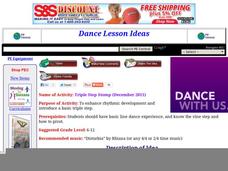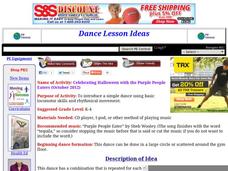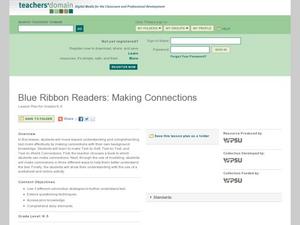Curated OER
A Different Point of View
Elementary schoolers utilize a pattern worksheet embedded in this plan to work on a deeper understanding of geometric concepts like symmetry and congruency. Since geometry is such a visual form of mathematics, this lesson plan should fit...
Curated OER
Making Music
Budding musicians engage in an exciting lesson which has them make musical instruments out of ordinary household items. By using paper plates, plastic cups, rubber bands, storage containers, and wooden spoons they make a variety of...
Curated OER
Fitness Dance
Get those youngsters moving! The activities put together to music are every day warm-up exercises. Jogging in place, jumping jacks, arm circles, and toe touches are a few of the movements presented to get children moving. Teach them the...
Curated OER
Making Up
Is there a more important skill to learn at school then conflict resolution? It's never too soon to begin teaching youngsters how to work through the inevitable conflicts they will have during their school years. This resource combines...
Curated OER
Occupy the Gym Floor
There are eight different steps in this line dance lesson: angle step, jump step, punch step, marching step, grapevine step, turn step, stop step, and down step. Each step has it's own eight-count. Teach these steps to youngsters and...
Curated OER
Thumbprints
Thumbprints are fascinating! Here is a clever lesson that allows kids to discover that everyone has a unique thumbprint - no two are alike! They use magnifying glasses to closely observe their own, and someone else's thumbprints. Then,...
Curated OER
Yoga Ball Bash
This line dance lesson involves the use of PE equipment. If you have yoga balls and rhythm sticks then take a look at this lesson. Of course there are other things that could be used instead of yoga balls. This is a 48-count dance...
Curated OER
Triple Step Stomp
Here's a 32-count line dance to the song "Disturbia" by Rihanna. This dance introduces the triple-step. It's a quick right-left-right or a quick left-right-left step. It's not complicated. The really nice thing about this lesson is that...
Curated OER
Tissue Paper Flowers
Here is a sweet and simple lesson that introduces young learners to the three primary colors; red, yellow, and blue. Through a discovery process, youngsters learn how to successfully identify these colors, and the many shades of these...
Curated OER
Skate Borders
Elementary schoolers explore how making different rectangular shapes with the same perimeter has an affect on the area of those shapes. Learners use the worksheet embedded in the plan to design their own skateboarding track. They use...
Curated OER
A Poetic Place
Here is a nice way to introduce your young learners to poetry and writing their own poems. Children create their own poems about their favorite quiet-time places. After listening to some poems read aloud by the teacher, each child gets...
PBS
Patterns to the Rescue!
Track down the Cyberchase episode that this lesson is associated with. Using a worksheet that is embedded in the plan, learners must find the next two numbers and shapes (a double pattern). Once these have been discovered, pupils try...
Curated OER
Teach Me
Here is a lesson that expands on a classic teaching idea. Learners are encouraged to think of a skill they possess, or something cool they can do that can be taught to their classmates. Once the skills are identified, each student...
Curated OER
Celebrating Halloween With the Purple People Eaters
Get youngsters moving by teaching them some basic dance moves. This dance can be done in a circle, a line, or scattered around the gym. There are four movement combinations that are taught to the song "Purple People Eater" by Sheb...
Curated OER
Using Rhythm to Teach Patterns and Directions
Introduce young learners to line dancing. Here are some simple movement patterns to teach them. First teach, repeat, and repeat again without music. Then when they have a pretty good grasp of the movement patterns, add music and practice...
Curated OER
Blue Ribbon Readers: Making Connections
Model for young readers how to make the shift from passive to active reading by making text-to-self and text-to-text connections. After a series of activities that provide guided practice, the focus shifts to making text-to-words...

















